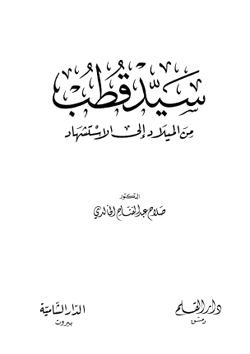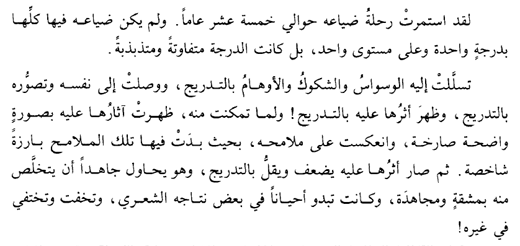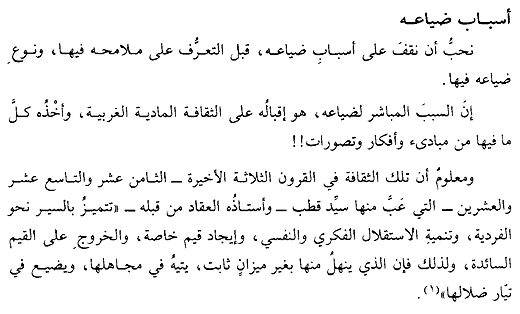
Monday, January 25 2010 - by Admin
Read more articles at TheMadkhalis.Com
The Reality Behind The Existence of the Greatest of Calamities in the Works of Sayyid Qutb
 The realities can be arrived at by looking at what Salaah al-Khaalidee has written in his book (من الميلاد إلى الإستشهاد) "From Birth to Martyrdom" a biography of Qutb (pp. 213-215) regarding the period of "wastage" in Qutb's life. Note that this biography is one written in a favorable light and so it is not an adverse source of information. This is a second edition print from 1994CE.
The realities can be arrived at by looking at what Salaah al-Khaalidee has written in his book (من الميلاد إلى الإستشهاد) "From Birth to Martyrdom" a biography of Qutb (pp. 213-215) regarding the period of "wastage" in Qutb's life. Note that this biography is one written in a favorable light and so it is not an adverse source of information. This is a second edition print from 1994CE.
In this entire section spanning forty or so pages Khaalidee discusses the period of doubt and confusion that Qutb went through for 15 years of his life until the 1940s, and in which he (anda his mentor of the time Abbaas al-Aqqaad, poet, writer, philosopher, existentialist) simply "gulped down" (Khaalidee's expression) the materialist philosophies of the 18th, 19th and 20th centuries.
We can bring a few quotes here from al-Khaalidee. He says (p. 23)

The journey of Qutb's (period) of loss (confusion), is the phase in which he acquired the elementary foundations, of the Jaahilee European and Western ideologies, conceptions and philosophies, concerning existence, life, humanity, and this brought about confusion, gloominess, doubt, and bewilderment and unrest! [In that] it clashed with whatever was with him of affirmations of Islam, which he had acquired since his childhood and youth, and in his various studies.
And then a page later (p. 214)

Sayyid Qutb had informed Abu al-Hasan an-Nadwi, when the latter met him in the year 1951H - after [Qutb] had ended his period of loss (confusion, wastage) - that he had been raised upon the traditions of Islaam in his childhood in the rural town, and when he travelled to Cairo he turned towards literature, literary criticism, and study of culture, civilisation, and he began to take lessons in Western materialist culture, and this made him pass by a phase of doubt (shakk), and uncertainty (irtiyaab) about religious realities - "to the farthest (extremest) limit!" - upon his own words to the letter!
And he then says, after mentioning Qutb turning towards the Qur'an and it's study, (p. 215):

The period of his (Qutb's) wastage continued for about 15 years, and in that period his wastage was not all at one degree or one level, rather it was of varying fluctuating levels.
The whisperings, doubts and suspicions invaded him gradually, and they reached his soul and his imagination gradually, and their effects appeared gradually! And when they took hold of him (became rooted), then their effects appeared upon him in a very clear, "screaming-out" form, and they were mirrored in his outward appearances, in that outward appearances got taken over by them prominently and visibly.
Then their effect began to weaken and diminish gradually, and he would try to rid himself from it with difficulty (hardship) and struggle, and they would appear sometimes in some of his poetical expressions, and they would be hidden and concealed from others!
And he says at the bottom of page 215 and continuing onto the next page:

Reasons for his Wastage [In His Life]
We would like to pause over the reasons for his wastage before familiarization with his traits (in that period) and the type of his wastage (in that period).
The immediate reason for his wastage was his turning to the Western materialist cultural (heritage), and taking what it contained of elementary principles, ideologies and concepts!!
And it is known that the cultural heritage of the last three centuries - the 18th, 19th and 20th - from which Sayyid Qutb, and his teacher al-Aqqaad before him, gulped down (i.e. drank heavily) - "is distinguished by its tendency towards individualism, and expanding self-independence and independent thinking, and to bring about a (new) specific orientation, and to depart from the [current] prevailing orientation. And for this reason, the one who drinks from them without any firmly established scale, will be lost in its unknown terrains and will be ruined (wasted) in the [flowing] current of its misguidance."
We brought these quotes as part of our longer previous article:
- Readings in Elementary Communism: Karl Marx, Freidrich Engels, Sayyid Qutb, Capitalism, the State, Social Justice, Revolution and the Communist Manifesto - (see here)
In which we outlined the Marxist Socialism maxims which Qutb used as part of his critique of Capitalism and in the process ended up saying that Islam is a concoction of Communism and Christianity and that it adds harmony to their objectives. At the end of that article, after quoting from Qutb's books to show how he essentially incorporated the basic framework of Marx and Engels "Communist Manifesto" to speak of "Social Justice", and upon which he attacked the Companions of Allaah's Messenger (alayhis salaam), and from which he outlined his "Marxist-Leninist" form of revolution, we made the following summary remark:
Then in 1952 he was instrumental in the July revolution, a Socialist, Marxist, Leninist type revolution through which Jamal Abdul-Nasser came to power, and when he fell out with this former comrade and was put into prison in 1954. He then started penning down the Communist Revolutionary Manifesto embodied in Leninism in his books "Milestones" and "az-Zilal", which became the spring and fountain for the madhhab of the Khawaarij. And he did not outline his revolutionary doctrines because he was imprisoned, being forced due to the circumstances, out of anger and resentment, as some people claim. Rather he was already ideologically upon that, and he'd plotted one successful socialist revolution already.
So the Communist Revolutionary Manifesto and what it contained of the notions of "Social Justice" [think Dhul-Khuwaisarah and the "unfair distribution" of "capital" that was not "just"] and "revolution" [think the revolution of Abdullah bin Saba' against the third Khalifah Uthman (radiallaahu anhu)] - these notions became the backbone for the aqidah of the 20th Century Khawaarij who were nurtured upon the works of Sayyid Qutb, all of whom strangely and ironically enough, came out in the name of "al-Haakimiyyah" itself.
Thank's Marx, Engels and Lenin! You brought the Qutbiyyah their "Social Justice", "State" and "Revolution" - just like those Jews and Christians brought al-Ma'bad al-Juhanee, al-Ja'd bin Dirham and al-Jahm bin Safwan their doctrines of the negation of al-Qadar, the Qur'an being created, and the negation of Allaah's Attributes. And just as those innovators put the Ummah to trial with a mighty tribulation (the fitnah of the creation of the Qur'an), then indeed the 20th century Jahmite Ash'ari, Sufi Mufawwidhs of Egypt put the Ummah to trial with a mighty tribulation with their "fikr" that unleashed untold splits, divisions, vile hizbiyyah like never seen before with fanatical bigotry through the jamaa'aat (groups) and jam'iyyaat (societies) they spawned, let alone the destructive Extremism in Takfir, Takfir of the whole Ummah, of its rulers, scholars and general-folk, in addition to the ideological justification of terrorism in both Muslim and non-Muslim lands against innocent men, women and children.A man poisoned with Western and European materialist philosophies for much of his life, with none as his teachers except Abbas al-Aqqaad and the authors of those books he was "gulping" (mostly Western philosophers). He then turned towards Islam and started writing books. And thus, with no knowledge of either the foundations of Islaam or its branches, he brought in his books calamities, upon calamities. The bid'ahs of the Jahmiyyah, Mu'tazilah, Ash'ariyyah, Mufawwidah, Jabariyyah, Ittihaadiyyah, he brought the maxims and philosophies of secular atheist Jews (Communism) and fused them with Islam, claiming Islam is a fusion, blend of such philosophies along with Christianity, he attacked the Companions of Allaah's Messenger on account of the "Social Justice" he envisaged through those Communist Marxist ideals.
Related Articles:
- The Prophetic Hadeeth in Refutation of Sayyid Qutb's Secularist, Marxist Communist Principles
//www.themadkhalis.com/md/?mesxs
- Defending and Exonerating Islam From Sayyid Qutb's Islamo-Communism
//www.themadkhalis.com/md/?qhaxj
- Salaah al-Khaalidee: Qutb Drank Heavily From the Western Materialist Philosophies Which Led Him To Doubt Islam for 15 Years
//www.themadkhalis.com/md/?edera
- Readings in Elementary Communism: Karl Marx, Freidrich Engels, Sayyid Qutb, Capitalism, the State, Social Justice, Revolution and the Communist Manifesto
//www.themadkhalis.com/md/?dsppw
- Shaykh Hammad al-Ansari on the Saying of Sayyid Qutb That Islam is a Mixture of Communism and Christianity
//www.themadkhalis.com/md/?jevki
- Impaling Leninist Qutbi Doubts: Shaykh Ibn Jibreen Makes Takfir Upon (Declares as Kufr) the Saying of Sayyid Qutb That Islam Is a Mixture of Communism and Christianity
//www.themadkhalis.com/md/?bguiq
- Sayyid Qutb: Establishing the Haakimiyyah of Allaah (By Borrowing The Manifestos of Secular Atheist Jews)
//www.themadkhalis.com/md/?rhmeq
 The journey of Qutb's (period) of loss (confusion), is the phase in which he acquired the elementary foundations, of the Jaahilee European and Western ideologies, conceptions and philosophies, concerning existence, life, humanity, and this brought about confusion, gloominess, doubt, and bewilderment and unrest! [In that] it clashed with whatever was with him of affirmations of Islam, which he had acquired since his childhood and youth, and in his various studies.
The journey of Qutb's (period) of loss (confusion), is the phase in which he acquired the elementary foundations, of the Jaahilee European and Western ideologies, conceptions and philosophies, concerning existence, life, humanity, and this brought about confusion, gloominess, doubt, and bewilderment and unrest! [In that] it clashed with whatever was with him of affirmations of Islam, which he had acquired since his childhood and youth, and in his various studies.